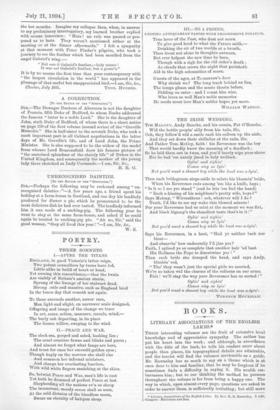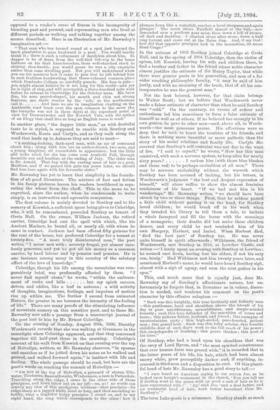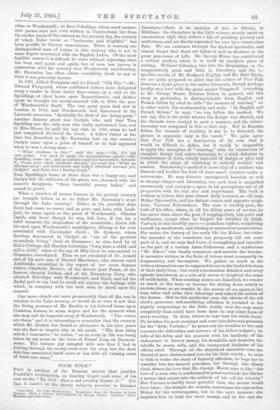BOOKS.
LITERARY ASSOCIATIONS OF THE ENGLISH LAKES,.
THESE interesting volumes are the fruit of extensive local knowledge and of appreciative sympathy. The author has put his heart into the work ; and although, in accordance with the title of the book, he tells his readers more about people than places, his topographical details are admirable, and the tourist will find the volumes serviceable as a guide. Mr. Rawnsley has so much to say on a theme which is at once dear to him and familiar, that he may be forgiven if he sometimes finds a difficulty in saying it. His wealth em- barrasses him ; but to our thinking the method he pursues throughout the volume is far from being a happy one. The way in which, upon almost every page, questions are asked in order to answer them, is sufficiently irritating; but still more 4 Literary Assooiations of the Boglish Lakes. By Roy. H, D. Rawnsloy. 2. vols.. Glasgow : Maclohose and Son. opposed to a reader's sense of fitness is the incongruity of +blending past and present, and representing men who lived at different periods as walking and talking together among the scenes described. Here is an illustration of Mr. Rawnsley's imaginative art :— " That man who has turned round at a spot just beyond the larch plantation to gaze backward is a poet. You would hardly think it ; there is such a refinement of dandyism about him. So dapper is he of dress, from the well-tied bob-wig to the brass buttons on his drab knee-breeches, from well-starched stock to shining shoe-buckle, you would guess he was a city exquisite rather than some strolling poet. But you will understand when ru see his neatness how it came to pass that he left behind him an such faultless handwriting that three-volumed common-place which Pembroke College so carefully guards. His face is pale— you might almost believe he is not long for this world—and yet lie is light of step, and will accomplish a three-hundred mile walk before he returns to Cambridge for the October term. His brow dine, his nose parrot-shaped, his mouth and chin not strong features, are made weaker by the nob,' as the northerners
call it And here we are in imagination chatting on the Ambleside road track over the open common to the moor (for the turnpike was not in those days) at the superheat point of view for Derwentwater and the Keswick Vale, with the author of an Elegy that shall live as long as English verse is read."
In another place, " the dapper little man," as with doubtful taste he is styled, is supposed to ramble with Southey and Wordsworth, Keats and Carlyle, and as they walk along the road that leads up to Ashness they are said to meet- " A striking-looking, dark-eyed man, with an air of command about him ; along with him are an author-friend, two sons, and a young daughter, all remarkable in appearance; but the little girl looks tired, for she has come over Armboth Fell, through noontide sun and heather, at the ending of July. The elder man as Dr. Arnold. That boy with the curling mass of hair is a poet, Matthew, and if we passed this gate ten years later, we should end him here again with his favourite sister."
Mr. Rawnsley has yet to learn that simplicity is the founda- tion of all good literature. The mixture of fact and fiction in his fancy pictures leaves his readers bewildered in sepa- rating the wheat from the chaff. This is the more to be regretted, since the author, when he condescends to write simply, is an instructive and agreeable companion.
The first volume is mainly devoted to Southey and to the scenery of Keswick, a sufficient space being given to Coleridge, who, it will be remembered, preceded Southey as tenant of Greta Hall. On the owner, William Jackson, the retired oarrier, Coleridge had cast the spell with which, like his Ancient Mariner, he bound all, or nearly all, with whom he came in contact. Jackson had been offered fifty guineas for the rent of the house, but preferred Coleridge for a tenant at 'twenty-five. "A more truly disinterested man," the poet writes, " I never met with ; severely frugal, yet almost care- lessly generous, and yet he got all his money as a common -carrier, by hard labour and by pennies and pennies. He is one instance among many in this country of the salutary 'effect of the love of knowledge."
Coleridge, though his life among the mountains was com- paratively brief, was profoundly affected by them. "I never find myself alone," he wrote, " within the embrace- ment of rocks and hills but my spirit careers, drives, and eddies, like a leaf in. autumn; a wild activity of thoughts, imaginations, feelings, and impulses of motion rise up within me. The further I ascend from animated Nature, the greater in me becomes the intensity of the feeling of life." There are many proofs of the stimulating influence of mountain scenery on this sensitive poet, and to these Mr. Rawnsley now adds a passage from a manuscript journal of 'the poet lent to him by Mr. Ernest Coleridge.
On the evening of Sunday, August 29th, 1800, Dorothy Wordsworth records that she was walking at Grasmere in the moonlight when Coleridge appeared, and that they conversed together till half-past three in the morning. Coleridge's 'account of his walk from Keswick on that evening over the top of Helvellyn, written, as Mr. Rawnsley observes, "in spasms and snatches as if he jotted down his notes as he walked and caused, and walked forward again," is instinct with life and feeling. The whole passage should be read, but here are the poet's words on reaching the summit of Helvellyn :— " Ant now at the top of Helvellyn, a pyramid of stones, Ulla- water, Thirlinere, Bassenthwaite, Windermere, a tarn is Patterdale. `Travelling along the ridge, I came to the other side of those precipices, and down below but on my left—no, no I no words can convey any idea of this prodigious wildness—that precipice—its ridge sharp as a jagged knife, level so long, and then ascending so boldly, what a frightful bulgy precipice I stand on, and to my eight hand, the crag which corresponds to the other ! how it plunges down like a waterfall, roaches a level steepness and again plunges ! The moon above Fairfield almost at the full,—now descended over a perilous peat moss, then down a hill of stones, all dark and darkling. I climbed stone after stone, down a half crag torrent and came out at the Raise Gap. And, 0 my God how did that opposite precipice look in the moonshine, its name Steel Crags P " In the autumn of 1803 Southey joined Coleridge at Greta Hall, and in the spring of 1804 Coleridge, then the victim of opium, left Keswick, leaving his wife and children. there, to find a brother and father in the friend whose noble character almost justifies the estimate of Sir Henry Taylor, that while there were greater poets in his generation, and men of a far wider reaching philosophic faculty, " it may be said of him justly, and with no straining of the truth, that of all his con- temporaries he was the greatest man."
Not the best beloved, however, for that claim belongs to Walter Scott; but we believe that Wordsworth never made a falser estimate of character than when he said Southey was " cold." On the contrary, an excess of ardour and enthusiasm led him sometimes to form a false estimate of himself as well as of others. If he believed too strongly in his own genius, he gave to other men—and, above all, to Words- worth—the most generous praise. His affections were so deep that he took to heart the troubles of his friends, and there is nothing more beautiful or more pathetic than the story of his social relations and family life. Carlyle dis- covered that Southey's self-restraint was not due to the want of fire. "I said to myself," he wrote, " How has this man contrived, with such a nervous system, to keep alive for nearly sixty years P I reckon him (with those blue blushes and those red) tobe perhaps excitablest of all men." There may be nervous excitability without the warmth which Southey has been accused of lacking, but his letters, in Wordsworth's judgment " the best and deepest expression of himself," will alone suffice to show the almost feminine tenderness of his heart. "If we had met him in his wanderings," Mr. Rawnsley writes, " we should have been struck by two or three things. First, that he seldom passed a little child without patting it on the head, for Southey loved children ; he would break off in his work when they invaded his library to tell them a tale, to imitate a whole farmyard and fill the house with the meanings of a menagerie; their deaths did' but make these children dearer, and every child he met reminded him of his own Margery, Herbert, and Isabel. When Herbert died, died the best part' of Southey too. He was never quite himself in spirit afterwards ; Wilkinson, the friend of Wordsworth, met Southey in 1810, at Lowther Castle, and writes I lately spent an evening with Southey at Lowther; he seemed cast down, having lost his oldest, if not his only son, lately.' Had Wilkinson met him twenty years later, and mentioned Herbert's name, he would have heard Southey sigh, almost with a sigh of agony, and seen the mist gather in his eyes."
This, and much more that is equally just, does Mr. Rawnsley say of Southey's affectionate nature, but un- fortunately he forgets that, in literature as in valour, discre- tion is needed, and weakens his comment on the poet's character by this effusive eulogium " Such was this knightly, this true brotherly and fatherly man —this gentleman, head and shoulders above the itterata; of his day in pure unselfishness, unworldliness, and simple-minded honesty.; such this true defender of the sanctities of house and home ; this pattern father, husband, and friend; this exemplar of unostentatious piety ; this high-souled, pure-hearted, patient man ; this genial host. Such was this lofty scholar, this humble childlike doer of each day's work to the full reach of his power ; this encyclopedia of learning ; this grave thinker ; this poet of his time."
Of Southey, who had a head upon his shoulders that was the envy of Lord Byron, and "the most spirited countenance that ever human form was graced with," it is recorded that in the latter years of his life, his hair, which had been almost snowy white, grew perceptibly darker and, if anything, in- creased in thickness and a disposition to curl. Of this plenti- ful head of hair Mr. Rawnsley has a good story to tell :— " I once heard an American saying to our sexton Joe, as he looked upon Lough's monument in the church, Ken you tell me if Sutthey went to the grave with as good a suit of hair as he is here represented with ? " Ay,' said Joe, 'and a deal batter, and aw wunderful heed of hair, neah better hereaboot than Mr. Soothey'ES.' " The term Lake-poets is a misnomer. Southey stands as much alone as Wordsworth ; so does Coleridge, whose most memor- able poems were not even written in Cumberland, but from the earlier years of the century to the present day, the country of which Defoe wrote as "barbarous and frightful" has been prolific in literary associations. There is scarcely one distinguished man of letters in this century who is not in some degree associated with the English Lakes. Of the most familiar names it is difficult to write without repeating what has been said again and again, but of men less known in connection with the country than Wordsworth and Southey, Mr. Rawnsley has often either something fresh to say or what is not generally known. In 1835, Alfred Tennyson and his friend, "Old Fitz "—Mr. Edward Fitzgerald, whose published letters have delighted many a reader in these latter days—came on a visit to the Speddings at their house upon Bassenthwaite, and thither again he brought his newly-married wife in 1850, the year of Wordsworth's death. The two great poets had met in London in 1843, and Wordsworth had discovered in his Laureate successor, " decidedly the first of our living poets." Another famous guest was Carlyle, who said that Tom Spedding was the only man who really understood him, and to Mire House he paid the last visit, in 1865, when he had just completed Frederick the Great. A fellow visitor at the time has described to Mr. Rawnsley how on one occasion Carlyle came upon a print of himself as he had appeared when he was a young man "'What creature is this 9' said the sage.—' Oh, it's my own print! I'm glad to make its acquaintance again.'—Mr. Spedding came up ; and as Carlyle read the inscription beneath it, From your most obedient servant,' he cried out, g What an infernal story ; you were never any body's obedient servant yet, Carlyle ! ' and there was a hearty laugh."
Tom Spedding's home in those days was a happy one, and Carlyle felt the influence of the place, was charmed with the owner's daughters, "three beautiful young ladies," and ceased to growl.
What a number of names famous in the present century are brought before us as we follow Mr. Rawnsley's steps through the Lake country ! Hither in his youthful days Scott had come as wooer and as poet, and here, with Lock- hart, he came again as the guest of Wordsworth. Charles Lamb, oity lover though he was, felt here, if but for a brief moment, the inspiration of the mountains ; Keats left his card upon Wordsworth's mantelpiece, Elleray is for ever associated with Christopher North ; De Quincey, whom Southey denounced to Carlyle as "one of the greatest scoundrels living," lived at Grasmere ; so also, hard by at Nab's Cottage, did Hartley Coleridge, "long time a child, and still a child," when at the age of fifty-three he was carried to Grasmere churchyard. Then we are reminded of Dr. Arnold and of his poet son, of Harriet Martineau, who almost ruled Ambleside, according to the report of her more famous visitor, Charlotte Bront6; of the devout poet Faber, of the famous chemist Dalton, and of Sir Humphrey Davy, who climbed Helvellyn with Wordsworth and Scott, and led the Rydal poet to say that he could not express the feelings with which, in company with two such men, he stood upon the summit.
One name stands out more prominently than all the rest in relation to the Lake scenery, or would do so were it not that the living presence of Mr. Ruskin in his beloved home upon Coniston, lessens in some degree and for the moment what one may call theimperial sway of Wordsworth. " Two voices are there," and it is interesting to remember that the country which Mr. Ruskin has found so attractive in his later years was the first to inspire him in his youth. " The first thing which I remember," he writes, " as an event in life was being taken by my nurse to the brow of Friars' Crag on Derwent- water. The intense joy mingled with awe that I had in looking through the mossy roots over the crag into the dark lake has associated itself more or less with all twining roots of trees ever since."



































 Previous page
Previous page